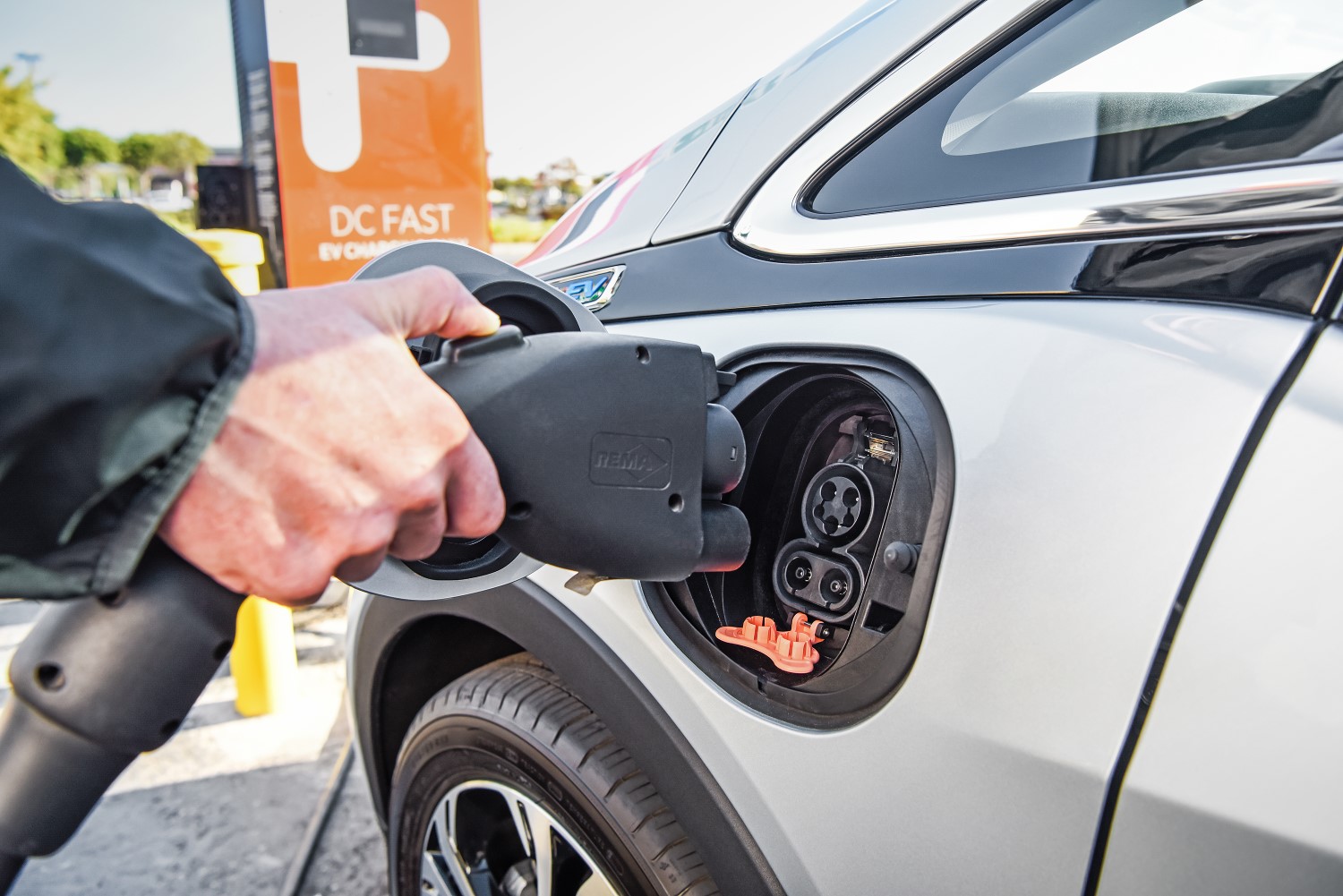Supercapacitor breakthrough suggests EVs could charge in seconds (2nd Update)
 |
| When an electric car can recharge faster than filling your tank with gasoline, there will no longer be a need for cars to burn fossil fuels – none. |
UPDATE The new material produces super-capacitors which are a safer, faster charging, more efficient, and greener alternative to both battery power and other super-capacitors.
The material is made from a special form of polymer – large organic molecular chains composed of many repeated sub-units.
These sub-units then bond together to form a 3D network.
Super-capacitors store energy using electrodes and electrolytes, and both charge and deliver energy quickly.
Conventional batteries charge and deliver energy in a much slower, more sustained way.
The technology could have a seismic impact across a number of industries, including transport, aerospace, and the energy industry.
Electric cars are currently limited to distances of around 54 miles before they need recharging, around the distance from London to Brighton.
But with the new technology, this range could be extended eight times to 414 miles.
The material is made from a special form of polymer – large organic molecular chains composed of many repeated sub-units. It could help recharge a phone in seconds
Supercapacitor buses are already used in China, but they have a very limited range.
The new technology could expand that range from needing to recharge every two to three journeys, to every 20 to 30 journeys.
Each recharge would now only take a few seconds.
 |
| In 5 years or less we'll be sticking a fork in the internal combustion engine. It will be done. |
Entrepreneur Elon Musk of SpaceX and Tesla has previously suggested that superconductors are the best route to electric air travel.
And the new finding, a joint effort from researchers at University of Surrey and University of Bristol, may provide an answer.
The researchers found a new polymer that has opened the door to capacitors which can carry an unprecedented amount of energy per kilogram.
Super-capacitors have traditionally carried very little energy for their size, meaning super-capacitors have to be up to 20 times larger than batteries to carry the same amount of power.
This has made super-capacitors too large for everyday items such as mobile phones or laptops.
Super-capacitors have long been hailed as a powerful alternative power source to batteries.
They can charge and discharge at rapid speeds, and store significantly more power than regular batteries.
The finding could revolutionize electric cars, allowing them to recharge in seconds instead of the current six to eight our charge time, and extending their range eight times.
Dr Brendan Howlin of the University of Surrey, co-lead on the project, explained: 'There is a global search for new energy storage technology and this new ultra capacity super-capacitor has the potential to open the door to unimaginably exciting developments.'
And the researchers aren't simply stopping at power sources.
'While this research has potentially opened the route to very high density super-capacitors, these polymers have many other possible uses in which tough, flexible conducting materials are desirable, including bioelectronics, sensors, wearable electronics, and advanced optics,' research co-leader Dr Ian Hamerton, of the University of Bristol, said.
'We believe that this is an extremely exciting and potentially game changing development.' Harry Pettit/Dailymail.co.uk
12/07/16 A scientific breakthrough at the University of Surrey could completely change how we charge our devices. Researchers developed a new material that could be used to create supercapacitors 1,000 to 10,000 times more powerful than conventional batteries. The new super batteries would also be safer, faster charging, more efficient, and greener.
The breakthrough is made possible by a special type of polymer that is, surprisingly enough, adapted from the principles used to make soft contact lenses. Supercapacitors have long been considered a superior alternative to batteries – able to charge and discharge energy incredibly quickly. However, until now, the materials used for these devices have had a poor energy density that limited their usefulness. This new, denser polymer could change all that.
This groundbreaking new technology could allow electric cars to finally become competitive with conventional vehicles. Cars equipped with the new supercapacitors could be charged in minutes, taking no longer than the time it takes to fill a normal vehicle with gasoline. It could also completely transform our household devices and appliances, allowing phones and laptops to charge in mere seconds.
The development seems to confirm what Elon Musk has been predicting for years: that supercapacitors are likely the future of electric transportation. With this new breakthrough, it’s only a matter of time before faster-charging EVs capable of traveling far longer distances hit the market.
| Supercapacitors are still in their infancy. This is just the beginning of their development – development that will lead to eventual replacement of batteries |
12/07/16 Supercapacitors may be providing an alternative to electric-car batteries sooner than expected, according to a new research study. Currently, supercapacitors can charge and discharge rapidly over very large numbers of cycles, but their poor energy density per kilogram — at just one twentieth of existing battery technology — means that they can't compete with batteries in most applications…..until now.
That's about to change, say researchers from the University of Surrey and University of Bristol in conjunction with Augmented Optics. They have announced a breakthrough in supercapacitors, which are said to be between 1000 and 10,000 times more powerful than equivalent lithium-ion batteries and considerably quicker to recharge.
However, they lack the storage capacity found in traditional automotive-grade lithium-ion batteries used in today's electric cars. But Jim Heathcote, chief executive of Augmented Optics Ltd and Supercapacitor Materials Ltd, says consumers would likely still be happy with the trade off by having faster charging times. "A lot of people would be more happy with a half the range of a 300-mile, lithium ion-batteried EV, but a fast charging time". If their research can be translated into the consumer market, EVs could re-charge in a time quicker than filling a vehicle with a tank of gasoline.
Tesla CEO Elon Musk has remarked in the past about the use of supercapacitors in electric vehicles, "If I were to make a prediction, I'd think there's a good chance that it is not batteries, but super-capacitors that will power electric cars in the future." The recent research could be a first sign that Musk's prediction from five years ago could one day come to fruition.
Why a combination of batteries and supercapacitors is essential to a sustainable future
In the next few decades, fossil-fueled cars and home-heating systems will need to switch to electric power to avert catastrophic climate change. Electricity has tremendous benefits but also one significant drawback: it's relatively difficult to store in a hurry. Batteries can hold large amounts of energy, but they take hours to charge. Capacitors are a solution to this dilemma, as they charge nearly instantaneously.
A supercapacitor solves the problem of storing a reasonable amount of energy for a relatively short period of time. Supercapacitors have been typically used as energy reservoirs to stabilize power supplies to electrical and electronic equipment. But supercapacitors can also be connected to batteries to regulate the power they supply. However, up until this point, they have only been able to store minuscule amounts of energy.
To truly have a feasible electric-powered lifestyle in which we can store and release large amounts of energy very quickly, we need efficiency in both batteries and supercapacitors. Supercapacitors help to solve the "energy versus power" conundrum. "Energy" is the capacity to do work. In physics, work is the act of exerting a force over a distance. While energy measures the total quantity of work done, it doesn't say how fast you can get the work done. "Power" is the rate of producing or consuming energy. Supercapacitors can bridge that divide and solve the inherent trade-off between EV energy and power.
Dr. Brendan Howlin of the University of Surrey said: "There is a global search for new energy storage technology and this new ultra-capacity supercapacitor has the potential to open the door to unimaginably exciting developments."
They hope to have a working prototype by spring 2017. "We are now actively seeking commercial partners in order to supply our polymers and offer assistance to build these ultra-high-energy density storage devices," said Heathcote. In current form, the high energy density supercapacitors could make it possible to recharge mobile phones, laptops, or other mobile devices in just a few seconds.
A fleet of supercapacitor-equipped buses is already in use in China, although they do not achieve the range proposed by the Surrey research team. Carolyn Fortuna/Teslarati
